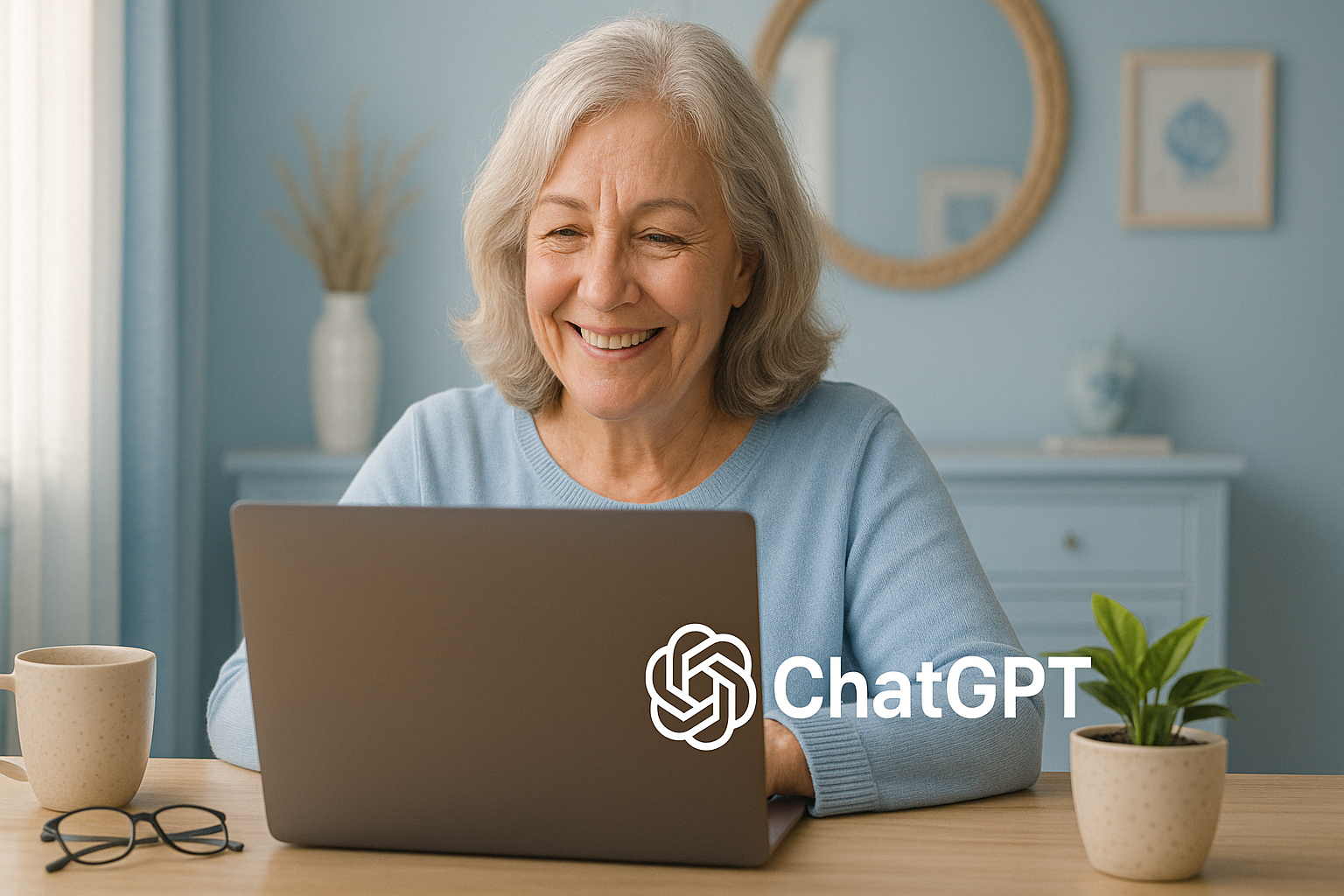
Your New Digital Assistant: How ChatGPT Can Make Daily Tasks Easier Than Ever
Have you ever wished you had a helpful friend available 24/7 who could answer questions, help you write emails, or explain confusing topics in simple terms? Well, that friend exists, and it's called ChatGPT! Don't let the technical-sounding name intimidate you—think of it as having a patient, knowledgeable assistant who never gets tired of helping. This guide will show you exactly how this amazing tool can simplify your daily life, one conversation at a time.
Why ChatGPT Matters for Your Daily Life
Artificial intelligence might sound like science fiction, but it's become as common as email or text messaging. ChatGPT is a free tool that millions of people use every day to get quick answers, write better emails, and tackle tasks that used to require calling someone for help or spending hours researching. The best part? It's designed to understand everyday language, so you can talk to it just like you would talk to a helpful neighbor. Learning to use ChatGPT isn't just about keeping up with technology—it's about having a powerful assistant that can save you time and make daily tasks more manageable.
What You'll Learn in This Guide
In this article, you'll discover: • What ChatGPT is and how to access it for free • Simple ways ChatGPT can help with writing, research, and everyday questions • A step-by-step example of getting help with email writing • How to use ChatGPT safely and protect your personal information • When you might want to consider the paid version
Getting Started: What Is ChatGPT?
ChatGPT is like having a conversation with a very well-read friend who can help with almost any question or task. You simply type what you need help with, and it responds with helpful, easy-to-understand answers. Think of it as a more advanced version of asking a question in a search engine, except instead of getting a list of websites, you get a direct, conversational answer.
To use ChatGPT, you simply go to chat.openai.com on your computer, tablet, or smartphone. You can use it for free without downloading anything—it works right in your web browser, just like checking email or reading the news online.
Everyday Ways ChatGPT Can Help You
Writing and Communication ChatGPT excels at helping you write emails, letters, or text messages. Whether you need help expressing sympathy, writing a thank-you note, or crafting a clear message to your doctor's office, it can suggest the right words and tone.
Research and Information Instead of searching through multiple websites, you can ask ChatGPT direct questions like "What are the symptoms of seasonal allergies?" or "How do I care for a houseplant that's losing leaves?" You'll get clear, comprehensive answers without clicking through confusing websites.
Technology Help Struggling with your smartphone, computer, or other devices? ChatGPT can explain technical concepts in simple terms and provide step-by-step instructions for common tasks.
Recipe and Meal Planning Ask for recipe suggestions based on ingredients you have, dietary restrictions, or cooking methods you prefer. It can even help you modify recipes for smaller portions.
Learning New Things Curious about a hobby, historical event, or current topic? ChatGPT can explain complex subjects in easy-to-understand language, making it perfect for lifelong learners.
Step-by-Step Example: Getting Help Writing an Email
Let's walk through a practical example. Imagine you need to write an email to your doctor's office about rescheduling an appointment, but you're not sure how to word it professionally.
Step 1: Go to ChatGPT Open your web browser and type: chat.openai.com Click "Start chatting" or "Try ChatGPT"
Step 2: Describe What You Need In the text box, type something like: "Help me write a polite email to my doctor's office. I need to reschedule my appointment next Tuesday because of a family emergency."
Step 3: Review the Response ChatGPT will provide a complete email that might look like this: "Subject: Request to Reschedule Tuesday Appointment Dear [Doctor's Office Staff], I hope this message finds you well. I am writing to request rescheduling my appointment currently scheduled for Tuesday, [date], due to an unexpected family emergency. I apologize for any inconvenience this may cause and would appreciate the opportunity to reschedule at your earliest convenience. Please let me know what alternative dates and times are available. Thank you for your understanding. Sincerely, [Your name]"
Step 4: Make It Your Own You can ask ChatGPT to adjust the tone by saying something like "Make it more casual" or "Make it shorter." The tool will revise the email based on your preferences.
Step 5: Copy and Use Once you're happy with the email, simply copy the text and paste it into your email program.
Using ChatGPT Safely: Protecting Your Privacy
While ChatGPT is a helpful tool, it's important to use it safely, just like any other online service. Here are key safety guidelines:
Never Share Personal Information Don't include your full name, address, phone number, Social Security number, or any passwords when asking questions. Instead of saying "I live at 123 Main Street," simply say "I live in Minnesota."
Keep Medical Information General It's fine to ask "What are common treatments for arthritis?" but avoid sharing specific medical details about your conditions or medications.
Don't Share Financial Details Never mention bank account numbers, credit card information, or specific financial amounts.
Remember It's Not Human ChatGPT is a computer program, not a person. While it's very helpful, it can sometimes make mistakes, especially with very recent information or complex medical or legal advice.
Use It as a Starting Point Think of ChatGPT as a helpful first step. For important decisions about health, finances, or legal matters, always consult with qualified professionals.
When You Might Want the Paid Version
The free version of ChatGPT is excellent for most daily tasks. However, if you find yourself using it frequently throughout the day, you might consider ChatGPT Plus, which costs about $20 per month. The paid version offers faster responses during busy times and access to newer features. But honestly, the free version is perfectly adequate for occasional use and all the tasks we've discussed.
Simple Questions to Try Today
Ready to give ChatGPT a try? Here are some beginner-friendly questions you can start with:
- "Explain how to backup photos on my iPhone in simple steps"
- "Help me write a thank-you note for a dinner invitation"
- "What's a simple recipe for chicken soup for two people?"
- "How can I make my home more energy-efficient?"
Remember, you can always ask follow-up questions or request clarification if the first answer isn't quite what you need.
Your Next Steps with Digital Confidence
ChatGPT represents just one example of how technology can work for you rather than against you. The key is approaching these tools with curiosity rather than fear. Start small, practice with simple questions, and gradually explore more ways this digital assistant can help streamline your daily life.
At Cyber Smart Seniors, we believe technology should make your life easier, not more complicated. ChatGPT is a perfect example of user-friendly innovation that puts powerful capabilities at your fingertips. Why not bookmark chat.openai.com and try asking it one simple question today? You might be surprised at how helpful and easy it is to use.
For more guides on making technology work for you, explore our other articles on digital tools that can enhance your daily life. And if you found this guide helpful, consider sharing it with a friend who might also benefit from having their own digital assistant. Together, we can build a community of confident, tech-savvy seniors!
- - - -
Copyright © 2025 Cyber Smart Seniors. All rights reserved. No part of this publication may be reproduced, distributed, or transmitted in any form or by any means, including photocopying, recording, or other electronic or mechanical methods, without the prior written permission of the publisher, except in the case of brief quotations embodied in critical reviews and certain other noncommercial uses permitted by copyright law.
- - - -



.png)






.png)

